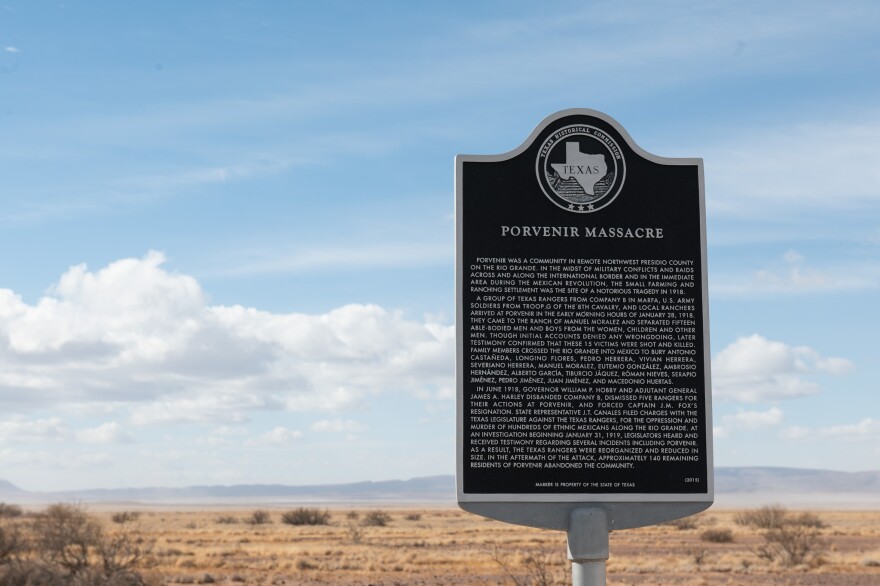More than 100 years after 15 Hispanic men and boys were shot and killed in an infamous borderland massacre in West Texas, a judge has signed off on formal death certificates for the victims.
In 1918, a group of Texas Rangers, U.S. soldiers and West Texas ranchers shot and killed the men and boys in the remote village of Porvenir, a small community on the Rio Grande in Presidio County. The Porvenir Massacre, as it became known, was part of a broader period of violence where Texas Rangers killed hundreds – or even thousands – of Mexican Americans on the border.
At a short court hearing Monday in Marfa, Judge Eduardo Gamboa addressed descendants of the victims, two of whom had traveled to West Texas for the occasion as others watched via a video feed.
"On behalf of the court I want to extend our condolences," he said. "It doesn't fix or bring light to why it happened, although most of us know why it happened."
In an unusual and perhaps unprecedented move in Texas, families of the massacre victims had asked Presidio County to approve 14 delayed death certificates for the victims, more than 100 years after their deaths. In 2019, a local judge approved just one such certificate, for Longino Flores, one of the 15 victims. But the descendants have continued to push for all the victims' deaths to be formally documented.
Gamboa on Monday agreed to approve the remaining 14 death certificates.
The newly approved death certificates each list a cause of death as "shot and killed," according to the Presidio County Clerk's office.
Amanda Moralez Shields, a descendant of victim Manuel Moralez, traveled to Marfa from Florida for Monday's hearing. Addressing the judge, Shields described the decades of work her family, particularly her father Jesus Moralez, had put into researching and more thoroughly documenting the massacre.
"This was something that my father had for many years sought: to get the story out," she said. "He passed away in 2023. This is, like, the final thing for our family, we want the final closure to this story."
Also present at Monday's hearing was Monroe Elms, a former Presidio County judge, whose ancestor Harry Warren was a local school teacher in 1918 and extensively documented his discovery of the massacre victims the day after the killings. His notebook from the time became a foundational historic document on the tragedy. Warren's own father-in-law, Tiburcio Jaquez Talamantes, was among the people killed in the massacre.
The perpetrators faced minimal repercussions at the time.. Some of the rangers involved were dismissed, and an investigation into the incident led to structural changes at the state police organization. But the men involved were never convicted of a crime. A state historical marker was erected near the site of the massacre in 2018, though the process was not without controversy after some locals challenged the language used on the marker.
"There's been a great injustice in this county for over 100 years," Elms said at Monday's court hearing.

Elms presented the judge with a letter from descendants who couldn't be physically present for the hearing but supported the effort to obtain the death certificates. In his remarks to the court, he described the effort as an important step in making sure such a tragedy never happens again.
"They were exterminated through the Texas system at that time," Elms said of the victims. "One thing we know about history: if we don't stand up and take action, history can repeat itself."
In an interview after the hearing, Shields said the day was an emotional culmination of years of work.
"Now it's finally done, so it kind of puts a closure to the story," she said. "This is it, finally, after over 100 years."
Yolanda Mesa, a descendent of victim Longino Flores who has also been involved in the push for death certificates, said in a phone interview Monday that she was grateful to the judge and local officials for "for willing to help us, hearing us out, and giving us closure."
This reporting was made possible by generous donations from supporters like you. Please consider making a donation to Marfa Public Radio to fund the journalism you rely on.
Copyright 2025 Marfa Public Radio





